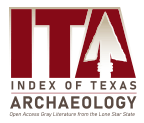Home > Research Projects and Centers > Center for Regional Heritage Research > Index of Texas Archaeology > Vol.
Article Title
Agency
Texas Historical Commission
Abstract
This report documents the substantive findings and management recommendations of a cultural resources survey conducted by Integrated Environmental Solutions, LLC (IES) for the Sparks Drive Valley Storage Project in the City of Cleburne, Johnson County, Texas. The project area or Area of Potential Effects (APE) encompasses approximately 14 acres (ac). As the project will require compliance with Section 404 of the Clean Water Act through the use of a Nationwide Permit from the U.S. Army Corps of Engineers (USACE), portions of the project will be subjected to the provisions of the National Historic Preservation Act (NHPA) of 1966, as amended. Additionally, the City of Cleburne is a political subdivision of the State of Texas. Therefore, the project is also subject to the provisions of the Antiquities Code of Texas (ACT).
The goal of this survey was to locate, identify, and document any cultural resources, which included architectural and archeological resources, that could be adversely affected by the proposed development, and to provide an evaluation of the eligibility potential of each identified resource for listing in the National Register of Historic Places (NRHP) or for designation as a State Antiquities Landmark (SAL). This cultural resources survey was conducted on 01 August 2019. All work conformed to 13 Texas Administrative Code 26, which outlines the regulations for implementing the ACT, and was conducted under Antiquities Permit No. 8993.
During the survey, no cultural resources were documented within the 14-ac APE. No artifacts were collected during this survey. All field and project-related records will be temporarily stored at the IES McKinney office and permanently curated at the Center for Archaeological Research at The University of Texas at San Antonio. Based on the results of this survey, no additional cultural resources investigations or evaluation of the APE is recommended. It is the recommendation of IES that the State Historic Preservation Officer, represented by the Texas Historical Commission, concur with these findings. However, if any cultural resources are encountered during construction, the operators should cease work immediately in that area and contact the project cultural resources consultant to initiate coordination with the THC and USACE prior to resuming any construction activities in the vicinity of the inadvertent discovery.
Creative Commons License

This work is licensed under a Creative Commons Attribution-NonCommercial 4.0 International License
Included in
American Material Culture Commons, Archaeological Anthropology Commons, Environmental Studies Commons, Other American Studies Commons, Other Arts and Humanities Commons, Other History of Art, Architecture, and Archaeology Commons, United States History Commons
Submission Location
Tell us how this article helped you.


